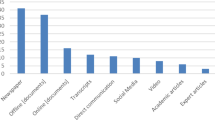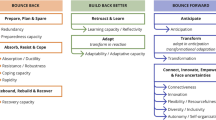Abstract
On September 20, 2017, Maria, the eleventh-most intense Atlantic hurricane ever recorded, made landfall at 6:15 am local time, the second category 5 hurricane to strike the island in as many weeks. What followed was one of the most challenging recovery situations since Hurricane Katrina struck New Orleans in 2005. Using 402 newspaper articles from The New York Times and the Wall Street Journal, I performed a deductive and inductive analysis of print news media frames to demonstrate the complex ways in which the discourse and actions of key social agents and institutions shape disaster risk for the archipelago before, during, and after Maria. Findings suggest media framing facilitated a lack of accountability for key institutions obliged to provide response and recovery. Key powerful actors, including President Donald Trump, shifted blame for the disaster from FEMA and other key institutions to Puerto Rico, effectively protecting the legitimacy of the Trump administration and its response in Puerto Rico. I argue that these processes are owed to economic factors. Here, Beck’s concept of an institutionally dependent “industrial society” is reconstituted in economically vital urban centers. In contrast, the failure of key institutions causes rural spaces to abandon them. This individualization of risk marks what Beck refers to as the emergence into a “risk society.” This article offers important implications for the study of media as a key site for the selective preservation of institutional legitimacy during disasters and the particular and contingent development of a risk society.
Similar content being viewed by others
Notes
A host of disaster literature focuses on myths perpetrated by the media and effects that those have on response and recovery (for examples see Tierney 2003, 2014; Tierney et al. 2006; Houston et al. 2012; Monahan and Ettinger 2018). While incredibly important, for the purposes of this article I am narrowing my focus specifically to how institutional responsibility and recreancy is framed before, during, and after disasters.
At this point, it is important to acknowledge the discrepancy between the two newspapers in regard to their distribution of coverage dedicated to Puerto Rico following Hurricane Maria. In the final six months of data collection the Wall Street Journal only contributed a single article to the sample, while the New York Times contributed twenty-three (Nov 2018–April 8, 2018). This suggests that the Wall Street Journal tired of the story in Puerto Rico long before their counterpart which should, in part, explain the discrepancy between the raw data and the need for systematic sampling.
Editorials were included in the sample for two reasons: to expand the size of the sample and to include broader public discourse beyond news reporting.
(Robles—NYT 2018).
Mazzei and Armendariz—NYT (2018).
References
Alexander JC (1996) Critical reflections on “reflexive modernization.” Theory Culture Soc 13(4):133–138
Althaus D, de Córdoba J (2017) Hurricane Maria roars toward Caribbean's outlying Eastern Islands; storm expected to cut through belly of Puerto Rico Wednesday as Category 4. Wall Street J (Online) September 18
Altheide DL (2007) The mass media and terrorism. Discourse Commun 1(3):287–308
Andrews N, Kesling B, Ballhaus R (2017) U.S. news: general is deployed to aid Puerto Rico. Wall Street J (Online), September 29
Beck U (1992) Risk society: towards a new modernity. Sage, London
Beck U (1997) Subpolitics: ecology and the disintegration of institutional power. Organ Environ 10(1):52–65
Beck U (1999) World risk society. Polity Press, Cambridge
Beck U (2008) World at risk: the new task of critical theory. In: Development and society
Bender MA, Knutson TR, Tuleya RE, Sirutis JJ, Vecchi GA, Garner ST, Held IM (2010) Modeled impact of anthropogenic warming on the frequency of intense Atlantic hurricanes. Science 327(5964):454–458
Block E (2013) A culturalist approach to the concept of mediatization of politics: the age of ‘media hegemony.’ Commun Theory 23:259–278
Boykoff MT (2011) Who speaks for the climate?: Making sense of media reporting on climate change. Cambridge University Press, Cambridge
Carlton J, Mann T (2017) After hurricane Irma, Virgin Islands recovery picks up with federal help; as coast guard brings supplies to hard-hit islands St. John and St. Thomas, residents sort through damage. Wall Street J (Online), September 13
Conway EM, Oreskes N (2010) Merchants of doubt: how a handful of scientists obscured the truth on issues from tobacco smoke to global warming. Bloomsbury, London
Cope MR, Slack T, Blanchard TC, Lee MR (2016) It’s not whether you win or lose, it’s how you place the blame: shifting perceptions of recreancy in the context of the deepwater horizon oil spill. Rural Sociol 81(3):295–315
Córdoba J, Campo-Flores A, Avila J (2017) Puerto Rico after Maria: no power, no cell signal, and lots of damage; many communities are cut off from communication; governor warns flooding, mudslides are 'giant problem'. Wall Street J (Online) September 21
Corbin J, Strauss A (2015) Basics of qualitative research: techniques and procedures for developing grounded theory. Sage, London, UK
Cottle S (1998) Ulrich Beck, ‘risk society’ and the media. Eur J Commun 13(1):5–32
Daley P, and O'Neill D (1997) Sad is too mild a word: press coverage of the exxon valdez oil spill. In: Picou JS, Gill DA, Cohen MJ (eds). Kendall-Hunt, Dubuque, IA, pp 239–253
Drabek TE (1986) Logic of the inventory. In: Human system responses to disaster: an inventory of sociological findings. Springer-Verlag, New York, NY
Ekberg M (2007) The parameters of the risk society: a review and exploration. Curr Sociol 55(3):343–366
Elliott A (2002) Beck’s sociology of risk: a critical assessment. Sociology 36(2):293–315
Fors BD (1975) The Jones act for Puerto Rico. Dissertations, Loyola University Chicago. https://ecommons.luc.edu/luc_diss/1438. Accessed 18 Feb 2020
Freudenburg WR (1993) Risk and recreancy: weber, the division of labor, and the rationality of risk perceptions. Soc Forces 71(4):909–932
Freudenburg WR (2003) Institutional failure and the organizational amplification of risk. In: Pidgeon NF, Kasperson RK, Slovic P (eds) The social amplification of risk. Cambridge University Press, Cambridge
Freudenburg WR, Gramling R (1992) Community impacts of technological change: toward a longitudinal perspective. Soc Forces 70(4):937–955
Freudenburg WR, Coleman CL, Gonzales J, Helgeland C (1996) Media coverage of hazard events: analyzing the assumptions. Risk Anal 16(1):31–42
Gill DA, Ritchie LA, Picou JS, Langhinrichsen-Rohling J, Long MA, Shenesey JW (2014) The Exxon and BP oil spills: a comparison of psychosocial impacts. Nat Hazards 74(3):1911–1932
Glanz J, Robles F (2018) How Bungling has kept Puerto Ricans powerless. The New York Times, May 7, pp A1
Gramling R, Freudenburg WR (1992) The Exxon Valdez oil spill in the context of US petroleum politics. Ind Crisis Q 6:175–196
Hall S (1980) Encoding/decoding. In: Hall S, Hobson D, Love A, Willis P (eds) Culture, media, language. Hutchinson, London, pp 128–138
Henríquez C, Coscarelli J, Paulson M, Schuessler J (2018) Creativity from the chaos of hurricane Maria. The New York Times, September 20
Hjarvard S (2008) The mediatization of society. Noridcom Rev 29:105–134
Houston JB, Pfefferbaum B, Rosenholtz CE (2012) Disaster news: framing and frame changing in coverage of major U.S. natural disasters, 2000–2010. J Mass Commun Q 89(4):606–623
Kishore N, Marqués D, Mahmud A, Kiang M, Rodriguez I, Fuller A, Ebner P, Sorensen C, Racy F, Lemery J, Maas L, Leaning J, Irizarry RA, Balsari S, Buckee CO (2018) Mortality in Puerto Rico after hurricane Maria. N Engl J Med 379:162–170. https://doi.org/10.1056/NEJMsa1803972
Klein N (2018) Battle for paradise. Simon and Schuster, New York
Kroll-Smith S (2018) Recovering Inequality: Hurricane Katrina, the San Francisco Earthquake of 1906, and the Aftermath of Disaster. University of Texas Press, Austin, TX
Lash S, Urry J (1994) Economies of signs and space. Sage, London
Littlefield RS, Quenette AM (2008) Crisis leadership and hurricane Katrina: the portrayal of authority by the media in natural disasters. J Appl Commun Res 35(1):26–47
Maestas CD, Atkeson LR, Croom T, Bryant LA (2008) Shifting the blame: federalism, media, and public assignment of blame following hurricane Katrina. J Fed 38(4):609–632
Mazzei P, Armendariz A (2018) FEMA vendor fired, millions of meals short. The New York Times, February 7, pp A1
Merchant Marine Act (1920) Pub L. No. 66–261, 41 U.S.C. Stat. 988 (1920)
Meyer M (2018) Social capital in disaster research. In: Rodriguez H, Donner W, Trainor JE (eds) Handbook of disaster research, 2nd edn. Springer, New York, pp 263–286
Monahan B, Ettinger M (2018) News media and disasters: navigating old challenges and new opportunities of the digital age. In: Rodriguez H, Donner W, Trainor JE (eds) Handbook of disaster research, 2nd edn. Springer, New York, pp 479–496
Moskin J (2019) The seeds of self-reliance. The New York Times, May 20, pp D1
Page P (2017) Today’s top supply chain and logistics news from WSJ. Wall Street J (Online), September 28
Pyles L, Svistova J (2015) A critical discourse analysis of Haiti Earthquake recover in New York Times articles: implications for welfare policies, practices, and education. Crit Soc Work 16(1):59–77
Quarantelli EL (1991) Lessons from research: findings on mass communication system behavior in the pre, trans, and postimpact periods of disasters. University of Delaware, Disasters Research Center, Newark
Ritchie LA, Gill DA, Farnham CN (2013) Recreancy revisited: beliefs about institutional failure following the Exxon Valdez oil spill. Soc Nat Resour 26(6):655–671
Robert T (1988) Stafford disaster relief and emergency assistance act of 1988, public law 100–707, United States Code, Title 42
Robles F (2018) FEMA was sorely unprepared for Puerto Rico hurricane, report says. The New York Times, July 12
Robles F, Alvarez L, Fandos N (2017) In battered Puerto Rico, governor warns of a humanitarian crisis. The New York Times, September 26, pp A14
Rodríguez-Díaz CE (2018) Maria in Puerto Rico: natural disaster in a colonial archipelago. Am J Public Health 108(1):30–32
Scurria A (2017) Hurricane Irma adds new fiscal strain for U.S. Territories; physical damage from storm is another stress on Puerto Rico's power infrastructure. Wall Street J (Online), September 7
Slack T, Parks V, Ayer L, Parker AM, Finucane ML, Ramchand R (2020) Natech or natural? An analysis of hazard perceptions, institutional trust, and future storm worry following hurricane Harvey. Nat Hazards 102:1207–1224
Southall A (2017) New York expands relief efforts for Puerto Rico after hurricane Maria. The New York Times, September 24
The New York Times (2018) “The shame in Puerto Rico.” Newspaper editorial, June 4, pp A22
Tierney K (2003) Disaster beliefs and institutional interests: recycling disaster myths in the aftermath of 9–11, pp. 33–51. In: Clarke L (ed) Terrorism and disaster: new threats, new ideas (research in social problems and public policy, vol 11). Emerald Group Publishing Ltd.
Tierney K (2014) The social roots of risk: producing disasters, promoting resilience. Stanford Business Books, Stanford
Tierney K (2015) Resilience and the neoliberal project: discourses, critiques, practices—and Katrina. Am Behav Sci 59(10):1327–1342
Tierney K, Bevc C, Kuligowski E (2006) Metaphors matter: disaster myths, media frames, and their consequences in hurricane Katrina. Ann Am Acad Political Soc Sci 604(1):57–81
Walsh MW (2018) Hurricane aid has eased Puerto Rico’s finances. It may not be enough. The New York Times, April 19
Williamson E (2017) Helping get what's needed where it's needed in Puerto Rico. The New York Times, October 12, pp A22
Willison CE, Singer P M, Creary MS, Greer SL (2019) Quantifying inequities in US federal response to hurricane disaster in Texas and Florida compared with Puerto Rico. BMJ Glob Health 4(1):e001191. https://doi.org/10.1136/bmjgh-2018-001191
Wisner B, Blaikie P, Cannon T, Davis I (2004) At risk, 2nd edn. Routledge, London, New York
Author information
Authors and Affiliations
Corresponding author
Ethics declarations
Conflict of interest
The author declared no potential conflicts of interest with respect to the research, authorship, and/or publication of this article.
Additional information
Publisher's Note
Springer Nature remains neutral with regard to jurisdictional claims in published maps and institutional affiliations.
Henríquez, Coscarelli, Paulson, and Schuessler 2018.
Rights and permissions
About this article
Cite this article
Straub, A.M. “Natural disasters don’t kill people, governments kill people:” hurricane Maria, Puerto Rico–recreancy, and ‘risk society’. Nat Hazards 105, 1603–1621 (2021). https://doi.org/10.1007/s11069-020-04368-z
Received:
Accepted:
Published:
Issue Date:
DOI: https://doi.org/10.1007/s11069-020-04368-z




